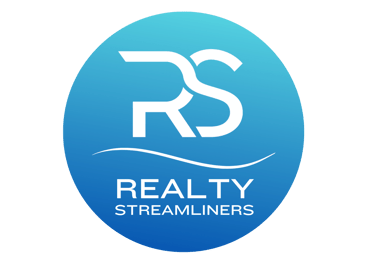Local SEO Tactics to Fill Listings and Grow Your Business
Learn the essential Local SEO strategies for property management companies. Our guide covers GBP, citations, and reviews to help you fill vacancies.
Lauren Poling
10/1/20258 min read
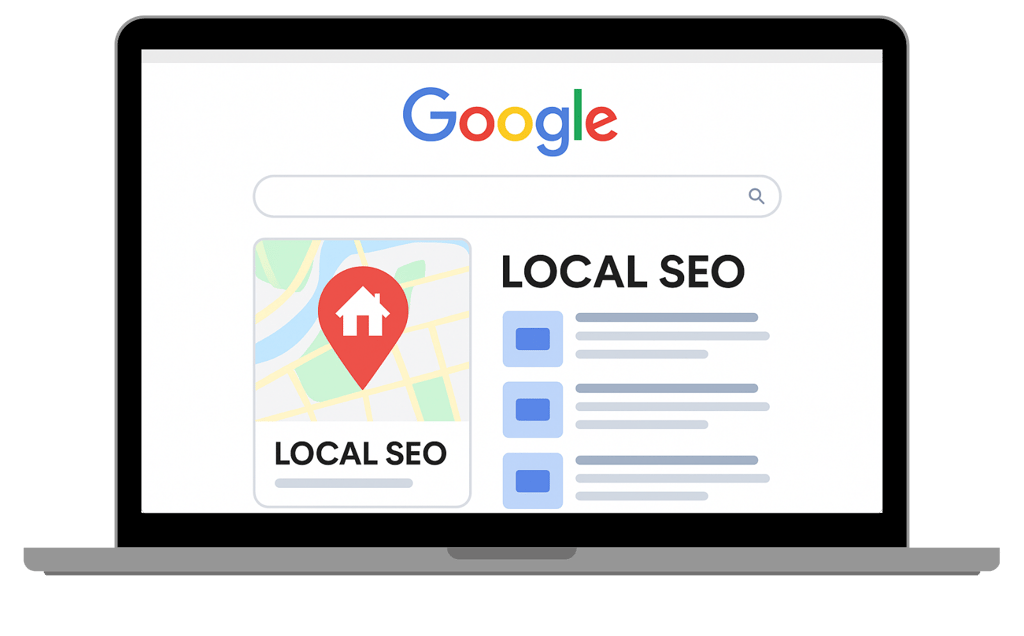

Are you looking at your list of available units and wondering why the phone isn’t ringing? You have great properties, but somehow prospective tenants are not finding you online. This common frustration can be solved with local SEO, which puts your business directly in front of people searching for a new home in your area.
Many property managers think online marketing is only for giant corporations, but that is not the case for small businesses. A focused local SEO strategy is about winning your own backyard. It is about showing up when a local customer searches for their next apartment and increasing your search traffic.
Table Of Contents:
What Exactly Is Local SEO and Why Should You Care?
The Foundation: Your Google Business Profile
Claiming and Verifying Your Properties
Optimizing Every Section
The Power of Google Posts and Q&A
Building Trust Through Local Citations
On-Page Local SEO Signals for Your Website
Location-Specific Pages
Keyword Strategy for Local Search
The Secret Sauce: Reviews and Reputation Management
How to Get More Reviews
Responding to All Reviews (Even the Bad Ones)
Putting It All Together: A Local SEO Checklist for Property Managers
Conclusion
What Exactly Is Local SEO and Why Should You Care?
Local search engine optimization is the practice of making your properties more visible in local search results on Google. It differs from general SEO, which focuses on ranking nationally or globally. Local SEO is all about showing up in searches tied to your specific geography. According to Moz’s Local SEO Guide, it helps businesses improve visibility in searches where proximity matters most. Local SEO is all about geography and reaching customers in your immediate service area.
Think about how people search for a place to live. They use phrases like “apartments near downtown” or “affordable housing in [Your City]”. A local search engine like Google understands this user intent and prioritizes results that are physically close to the searcher or the location they named.
This is why the Google “map pack,” also known as the “local pack,” is so valuable. It’s the block of three business listings that appear below the map in a search. A strong local search ranking makes it more likely your property appears in this prime digital real estate, driving more calls and website visits.
The Foundation: Your Google Business Profile
Your Google Business Profile (GBP) is your most important tool to improve local ranking. It is the information box that appears on the right side of a Google search and within Google Maps. Think of it as your digital storefront, a critical component of any successful SEO strategy. Google explains how to set up and optimize your profile here, but ongoing updates and optimization are what keep it competitive.
Many businesses claim their business profile and then leave it alone, which is a massive mistake. An optimized and active profile tells Google you’re a legitimate, active business worthy of being shown to people who search local. Proper GBP optimization is the solid foundation for all your other efforts.
Claiming and Verifying Your Properties
First, you need to claim a profile for each of your properties. If you manage multiple communities, each one needs its own separate Google Business Profile. This is non-negotiable for a multi-location business wanting to achieve high local rankings.
Google needs to confirm your business is located where you say it is. They typically mail a postcard with a verification code to the property’s physical address. Other verification methods, like phone calls or video verification, may also be available, but the postcard is the most common for this business type.
Optimizing Every Section
Once verified, fill out every part of your profile. Start with your NAP: Name, Address, and Phone number. Your Name, Address, and Phone (NAP) must be perfectly consistent everywhere online to build trust with search engines.
Next, choose the right categories. “Apartment Building” or “Apartment Complex” are good primary choices for your GBP listing. Add secondary categories like “Affordable Housing” or “Senior Living Community” if they apply, as this helps you appear in more specific searches.
Your business description should be helpful and engaging. Talk about the community, the types of units you offer, and key amenities. Remember to include keywords naturally, such as the neighborhood name or nearby landmarks, to improve local search visibility.
Photos and videos are extremely important. People want to see where they might live. Upload high-quality, recent photos of apartment interiors, the building’s exterior, common areas, and amenities. We have seen firsthand how great visuals directly lead to more calls and tour requests.
The Power of Google Posts and Q&A
Your GBP is not a static listing; it is an active platform. Use Google Posts to share updates, much like social media. Announce a rent special, highlight a community event, or showcase a newly renovated unit to keep your profile fresh and engaging.
The Questions and Answers section is another goldmine. Anyone can ask a question on your profile, and anyone can answer it. It is much better if you are the one giving the official answer. Proactively add common questions and your own answers, like “What are your pet policies?” or “What utilities are included in the rent?”. This shows you’re engaged and helps save time for your leasing team.
Building Trust Through Local Citations
A citation is any online mention of your property’s name, address, and phone number together. These local citations can appear on local business directories, industry-specific sites, and social media platforms. They are a core part of any good local strategy.
Think of each consistent citation as a vote of confidence for your local brand. When Google sees the same NAP information for your apartment community across many trustworthy websites like Apple Maps, it trusts that your location data is accurate. This trust helps your search rankings.
For property management, key directories include:
Google Maps/Apple Maps
Zillow
Apartment Guide
Yelp
Yellow Pages
The biggest challenge here is consistency. A small difference, like using “St.” on one site and “Street” on another, can confuse search engines and hurt your local search ranking. Using a listing management service can help maintain accuracy across hundreds of directories, saving you valuable time and effort.
On-Page Local SEO Signals for Your Website
Your website plays a huge role in your local search performance. It is where you send people from your Google Business Profile, and it’s another place Google looks for clues about your location and services. A comprehensive on-page SEO plan is necessary to compete. Strong on-page SEO is a must. Google even provides an SEO Starter Guide to help businesses build search-friendly websites that rank better locally.
Simply listing your properties is not enough. You need to structure your website to send clear local signals to search engines and potential renters. Performing a basic SEO audit can reveal areas for quick improvement.
Location-Specific Pages
If you manage more than one property, you must have a separate, dedicated page for each one. Do not just list them all on one “Our Properties” page. This is a common mistake that dilutes your SEO ranking factors and provides a poor user experience.
Each page should act as a homepage for that specific community. It needs to include:
The full name, address, and phone number.
An embedded Google Map of the location.
Photos and videos of that specific property.
Content about the local area, like nearby parks, schools, and shopping.
Unique testimonials from residents of that community.
This structure helps your search ranking in multiple specific towns or neighborhoods. It also gives potential tenants a much better user experience, showing them exactly what they want to see. This is why local on-page SEO is essential.
Keyword Strategy for Local Search
Your keyword strategy needs a local focus. Ranking for “apartments for rent” is highly competitive. You will find more success by targeting more specific, localized keywords related to your small business.
Think about what your ideal tenant would type into Google search. They might search for “two bedroom apartment in the heights” or “pet-friendly apartments near Lincoln Park.” Your website content, including blog posts and location pages, should include these kinds of specific phrases.
Use these keywords in your page titles, headers, and body content. Make it sound natural. Keyword stuffing will be noticed by both people and search engines, negatively impacting your organic search performance. Optimizing local content is a continuous process that adapts to algorithm updates.
Consider creating blog content about local events or neighborhood guides. This not only attracts local search traffic but also positions you as a community expert. Local link building, or getting other local businesses to link to your site, also sends strong geographic signals to Google.
The Secret Sauce: Reviews and Reputation Management
Online reviews are incredibly powerful. They serve as social proof for potential renters and are a major ranking factor for local searches. Google wants to show its users the best and most trusted businesses, and review signals are a primary way it measures that trust. Reviews aren’t just social proof, they directly influence rankings. In fact, BrightLocal’s Consumer Review Survey found that 77% of people regularly read reviews before choosing a local business.
A steady stream of positive reviews shows that your properties are well-managed and a good place to live. A BrightLocal survey found that 77% of consumers ‘always’ or ‘regularly’ read reviews when browsing for local businesses. This shows how much weight people place on the opinions of others.
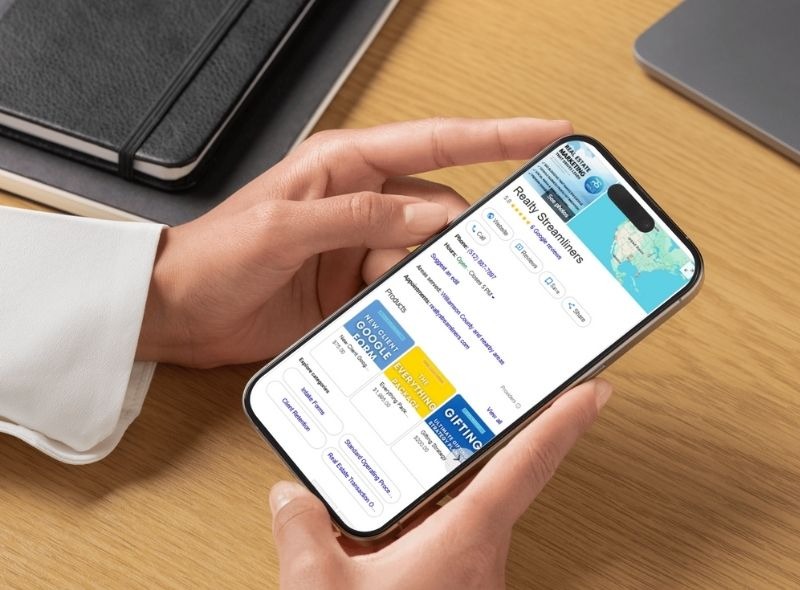

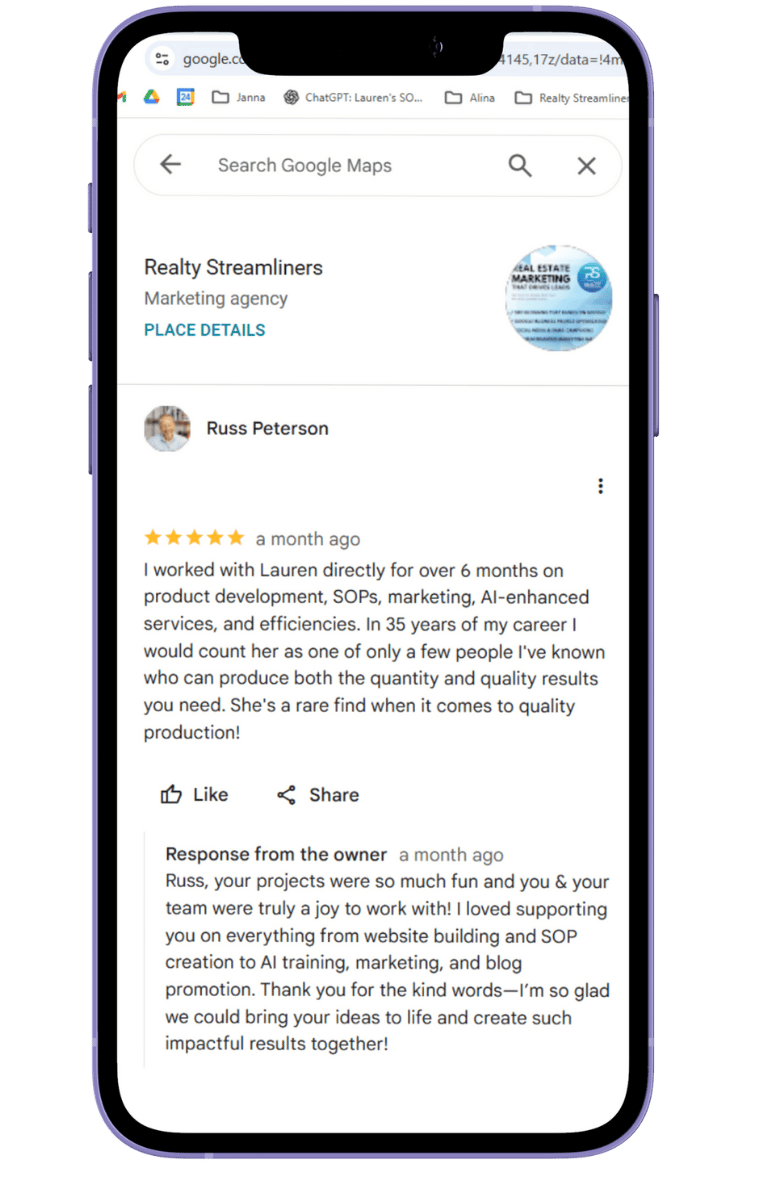

How to Get More Reviews
The best way to get reviews is to ask, but you have to do it the right way. Never offer incentives for reviews, as this violates Google’s policies and can get your business profile penalized. Your online visibility depends on following these rules.
You can ask happy tenants for feedback via a follow-up email after a maintenance request is completed. You could also include a small, friendly sign in your leasing office with a QR code that links directly to your review page. Make it as easy as possible for people to share their positive experiences.
Responding to All Reviews (Even the Bad Ones)
Responding to reviews is just as important as getting them. When you reply to a positive review, it shows you appreciate your residents. Thank them for their kind words and be specific if you can to show you are listening.
It’s even more critical to respond to negative reviews. Ignoring them makes it look like you do not care. A professional, calm response that acknowledges the issue and offers to take the conversation offline can actually win you points with prospective tenants who are watching how you handle conflict.
Putting It All Together: A Local SEO Checklist for Property Managers
Feeling overwhelmed? You do not have to do everything at once. Here is a simple checklist to get you started on the right path with your essential local SEO strategy.
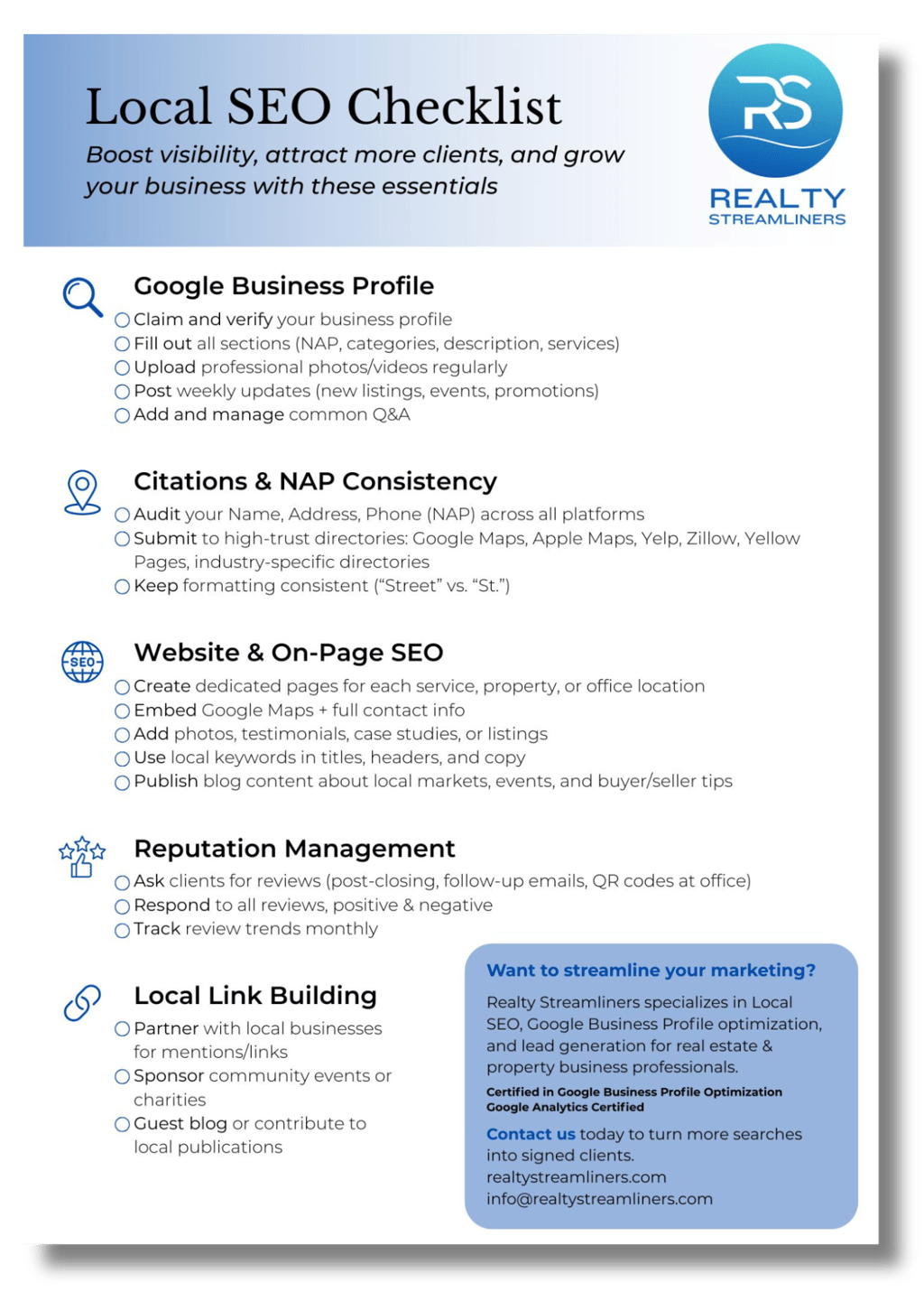

To get started with Local SEO, there are several key areas of focus. Google Business Profile is foundational: claim and verify all properties, fill out every section completely, add high-quality photos and videos regularly, and use Google Posts weekly to share updates.
Next is Citations & NAP. Audit your Name, Address, and Phone number for consistency across the web. Build local citations on key property rental directories and check major data aggregators to ensure accuracy.
For Website On-Page SEO, create a unique, detailed page for each property you manage. Target local keywords naturally in your content, and make sure your website includes a privacy policy and is mobile-friendly.
Reputation Management is another vital step. Create a simple system to ask happy tenants for reviews, respond to every single review (both positive and negative) in a timely and professional manner, and monitor your review signals constantly.
Finally, focus on Local Link Building. Partner with other local businesses for mentions, sponsor a local event or charity to earn links from community websites, and remember that this boosts your authority and local relevance. Search Engine Journal’s guide to local link building outlines practical strategies for getting started.
Conclusion
Dominating Google search local results does not happen overnight. It is a process that involves consistent effort across multiple platforms, from your Google local profile to your own website. Yet, the rewards are substantial for service-based businesses like property management.
By systematically improving your online presence, you can attract more qualified renters who are actively looking for a home in your area. Strong local SEO for your properties means fewer vacancies, a better community reputation, and a healthier bottom line. The effort to improve local search rankings is absolutely worth it.
Want help implementing these strategies? Realty Streamliners specializes in GBP optimization and local SEO for property businesses. Contact us today to streamline your marketing and fill more units.
